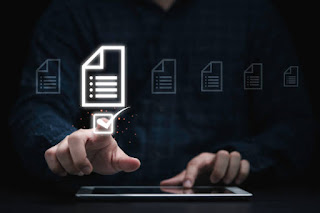HOW TO AVOID PLAGIARISM।Tips & Trics। Nullblogger।
HOW TO AVOID PLAGIARISM
Plagiarism occurs when
you use someone else's ideas, words, or work as your own without citing the
source. Any contribution, whether free or open access, is original and may not
be used without permission. Plagiarism is unethical because you try to pass off
your own work as someone else's. Furthermore, it is illegal because you are
infringing on the copyright of one or more works, violating their moral and
patrimonial rights, and this action is punishable by law.
Continue reading this
article to learn everything there is to know about plagiarism, including how to
avoid it.
WHAT IS
PLAGIARISM?
Plagiarism is the act
of substantially copying another person's work and passing it off as one's own.
Legally, it is an infringement of the creator's right to an artistic or
intellectual work of any kind. It is incurred when one presents a third-party
work as one's own or original. This is an infringement on the work's
authorship.
Remember that
plagiarism does not only refer to written works, but also to the copying of any
kind of work. Whenever you use external information, whether it's text, images,
graphics, videos, or any other type of information in any medium (printed,
digital, internet...), you must credit the original source and specify who
created it.
TYPES OF PLAGIARISM
Intentional plagiarism vs. unconscious
plagiarism
Plagiarism on purpose
It is intentional
plagiarism to present a work that is not one's own:
• Cut and paste
• Plagiarize the words
or ideas of others without citing them in order to pass them off as your own.
• Purchasing,
stealing, or borrowing another person's written work and passing it off as your
own.
• Presenting another
person's work as your own.
• Hire someone to
write the work and then pass it off as your own.
Unintentional plagiarism
Unconscious plagiarism
is typically caused by a lack of understanding of what constitutes plagiarism.
• Citations are
missing or incorrectly cited.
• It paraphrases
without departing from the original text; and • Thoughts or theories are
developed without citing others' ideas.
Plagiarism on the
internet.
WHAT CAN BE PLAGIARIZED?
Plagiarism affects all forms of information,
including literary, scientific, and artistic works:
• Books, brochures,
forms, writings, reports, conferences, and so on.
• Magazine articles,
newspaper articles, research from others, recordings, diagrams, graphs, tests,
and so on.
• Lyrical or
non-lyrical musical compositions
• Dramatic, musical,
choreographed, and theatrical works in general.
• Cinematic and
audiovisual works, multimedia works, and photographic works • Sculpture,
drawing, painting, and other plastic works • Architectural and engineering
works
• Drawings, signs,
models, patents, trademarks, slogans, and popular phrases of industrial arts
objects
• Works that are
derivatives of the originals, such as translations, adaptations, revisions,
compendiums, musical arrangements, and so on.
• Discussions, private
communications, and ideas expressed in a variety of forums
WHY SHOULDN'T YOU
PLAGIARIZE?
Revisions,
compendiums, and musical arrangements, to name a few.
Because plagiarism is
both unethical and illegal.
Plagiarism is
unethical because it involves stealing someone else's work. It is also illegal
because it violates some intellectual property regulations.
Remember that
plagiarism is a crime that is even criminalized in the Penal Code when it is
done for profit and causes harm to third parties.
HOW CAN YOU AVOID PLAGIARISM?
To avoid plagiarism it
is important to be rigorous when using third-party content. The best tool to
avoid plagiarism is to cite and reference the content.
You avoid plagiarism
whenever you put quotation marks around each other's text that you have used
literally and accompany it with its corresponding citation, that is, a brief
reference to who created it and to the source from which you obtained it.
Another way to avoid
plagiarism is to paraphrase, that is, to explain another person's ideas and
concepts in our own words. To paraphrase without incurring plagiarism, you must
write differently from the original and not only replace the words with
synonyms. When paraphrasing, you should not put quotation marks around the
text, because we have transformed the original, but you must always cite the
source and authorship of the paraphrased idea or concept. If you don't, you are
committing plagiarism.
If you want to make
use of someone else's authorship, always do so within the legal framework.
Remember that the Intellectual Property Law allows you to:
· Use those materials
that are in the public domain if you acknowledge the authorship and mention the
original source.
· Use the works that
have been created under free licenses as long as you respect the conditions of
their corresponding license and mention their authorship.
· Include in your own
works small fragments of other people's works already disclosed without the
need to obtain the authorization of the authors or rights holders, provided
that you do so by way of citation or for analysis, comment or critical
judgment, for academic purposes or research and duly acknowledge the authorship
and the source.
What are the risks and penalties in case of
plagiarism?
The loan of
unreferenced citations is a deception, an infraction of academic
regulations. The sanction depends mainly on the institution's policy,
whether it is a deliberate action by the plagiarist, the importance of the
plagiarized task, the repetitive nature of the fraud... Here are some examples
of sanctions related to plagiarism:
1. Academically
- Cancellation of the
test affected by plagiarism
- Warning/sanction
- Temporary or
permanent expulsion from any public institution of higher education
2. at the legal level
- From 6 months to 4
years, depending on severity
- Twelve to
twenty-four month fine
3. on a psychological
level
- Damage to the
reputation of the institution and the student
- Climate of suspicion
that accompanies the plagiarist for a long time and questions the rest of the
students
- Questioning the
value of the title and the quality of teaching





.png)




অর্ডিনারি আইটির নীতিমালা মেনে কমেন্ট করুন। প্রতিটি কমেন্ট রিভিউ করা হয়।
comment url